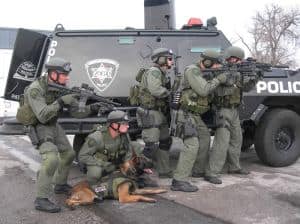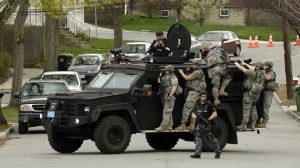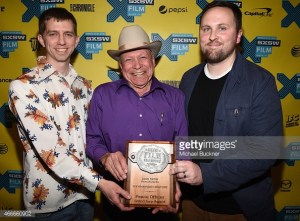Peace Officer or Killing Machine? (Interview)
Documentary film makers Scott Christopherson and Brad Barber are in New Zealand to attend the screening of their film Peace Officer at the New Zealand International Film Festival. Peace Officer explores the militarization of the police department in the United States, particularly the SWAT teams. Their chief character in the film is Dub Lawrence, a former law man who set up the first SWAT team in 1975 and who later, had his son-in-law killed by that same SWAT team. With fatal encounters between police and private citizens seemingly occurring every day, Scott and Brad have made a film that has people talking. The 13th Floor’s Marty Duda spoke to both of them about the making of Peace Officer.
Click here to listen to the interview with Scott Christopherson and Brad Barber:
Or read a transcription of the interview here:
MD: Well first of all, maybe you guys could give me a little background on how the two of you came to work together on it?
 SC: Brad was working on a series of short films where he does one person in every state of America and I decided to help him on one of the films in Oregon he was doing and we ended up driving to Oregon together and before that I had met Dub ,the main character, at a softball game, of all places and Dub had kind of approached me about his son in law’s story and said “Hey, will you teach me a few things about how to edit.” And he took me back to his airplane hanger, his place of business, and showed me all this footage and he had created a kind of two hour long edit of his son in law’s case which is really kind of a police chief’s analysis of angles and minutia of the case. It wasn’t very exciting or a cohesive story, it was more of an analysis.
SC: Brad was working on a series of short films where he does one person in every state of America and I decided to help him on one of the films in Oregon he was doing and we ended up driving to Oregon together and before that I had met Dub ,the main character, at a softball game, of all places and Dub had kind of approached me about his son in law’s story and said “Hey, will you teach me a few things about how to edit.” And he took me back to his airplane hanger, his place of business, and showed me all this footage and he had created a kind of two hour long edit of his son in law’s case which is really kind of a police chief’s analysis of angles and minutia of the case. It wasn’t very exciting or a cohesive story, it was more of an analysis.
MD: Probably needed some context no doubt.
SC: So after that, after I had met with Dub, Brad and I drove to Oregon together and I kind of ran the idea by him and said hey there is this really interesting character and I think he’s fascinating and Brad and I both from there decided we were going to pursue making a film about Dub in some way.
MD: So, how did the process evolve about how it became more of the militarization of the police rather than about Dub himself?
BB: We didn’t really start out with that aim, we didn’t set out to make a film about the militarization of police per se we were just really attracted to Dub as a character.
MD: He’s classic, you can’t ask for a better guy

BB: He’s like that in real life too and he’s very winning and engaging and he’s got a very complex story that we thought was totally fascinating. We got drawn into the bigger issue, as we started drilling down with him it just kept popping up in the news, not only nationally but even where we lived in Utah, it’s not a very crime ridden state but we kept hearing about these police shootings and SWAT team raids on pretty small time crime. We got kind of drawn in to the national debate. The more we talked with Dub, you know when you talk to someone about something and you start noticing that thing more because you know a little more about it and we started encountering other families, we would go to a rally or some of the people we interview might introduce us to other people who are victims of this kind of thing or that were involved in the issue in some kind of way. We talked to members of law enforcement as well so I guess it kind of evolved from Dub’s story I guess.
MD: So, when you were having these discussions I assume it was before Ferguson and all stuff had gone on in the States?
BB: Yes. We started shooting in the summer of 2012 and when Ferguson happened we were almost completely done with production and we had started editing even and that was very late in the process. So, yea we didn’t know that was going to happen it just happened right at the end of our process. We shot one or two interviews after that with Ferguson in mind, we felt like it would be crazy not to include it in some way or give a nod to it in some way with how much it galvanized the discussion in the States.
MD: It seems like it’s gotten even more relevant since then, there just seems to be more and more of these incidents popping up. Whether or not it’s militarization or it’s the police and the way they are interacting with the average citizen I guess. What has been the reaction to people seeing this now? You must be right in the hot spot.
BB: People are definitely recognizing it more, we’ve benefited from it being a national discussion in the States where people watch it and it’s the first thing people want to talk about is how timely it feels. I think what is really satisfying for Scott and I in terms of how people see it in post Ferguson world is that it would have been very easy to throw the police under the bus and make a sort of axe-grinding piece, but we really tried hard to give them a voice, hear their side of the story let them speak for themselves and not manipulate their story and that’s usually one of the first things people responded to in the States. They like how people are represented from both sides and it doesn’t alienate everyone who watches it. I think it’s easy to watch no matter where you’re coming from on the position and still be challenged a little bit. Think about some things but not be alienated by it being a very antagonistic and critical piece.
 MD: Was it difficult to get the police to co-operate with the film?
MD: Was it difficult to get the police to co-operate with the film?
SC: I would say it took some time to get the police to co-operate. It certainly was challenging. I first met with one of the main commanders in the SWAT team in the Matthew David Stewart case, the guy who was growing marijuana, the former military officer. I met with that commander, after meeting that commander he introduced me to the rest of the team who had raided the home and it took several months to persuade them of our intentions.
MD: Did you need to let them know you didn’t have a preconceived agenda going into it?
SC: It was definitely a huge concern of theirs. I remember sitting in a room with all of them. I think there was about 10 to 12 officers and they were kind of grilling me with questions about, what was the film about? What was my intention? Did I have an agenda? And I think having come from a family where my Grandfather was in law enforcement, he was in FBI agent for 25 years, I think, I like to say, we earned their trust. They could recognize that and tell we were sincere and that ultimately two of them in addition to many sheriffs, two of the SWAT team members decided they wanted to produce because Brad and I didn’t have a preconceived agenda, rather we wanted to let them speak, let others hear their voice in the film.
MD: Was it difficult to keep having the open-minded attitude as the process of making the film went along?
SC: I think this is something we should both respond to. I would say, for me it wasn’t difficult to have an open-minded attitude about letting them speak. As a filmmaker it’s always been important to me to somehow ethically represent both sides, if you are making a film where there are two opposing sides. Certainly when things happen like Ferguson and other things like that where it looks like there’s maliciousness on the side of police, to me I was centered on the idea that it was important to not always group every police officer into these isolated incidents but rather, if possible, find a way to respect police officers and let them speak and I think that is something both Brad and I, like he mentioned earlier, we are proud of. I guess it depends on your analysis of it or the audience’s analysis of it but that’s something we feel we did, was to let them speak and have a level headed approach to the topic and issue.
BB: I don’t have much to add to that, other than we have a really high regard for the pioneers in our genre that most people do, Albert Maysles being one of them and Ross McElwee being one of them and we saw both those guys address topics that could have been really controversial, maybe were controversial, but I think they approached it in such an even handed way that to me it’s much more effective when you see empathy for everybody involved so that was one of the guiding influences for us I think.
MD: Do you have an ideal outcome to having folks see this film, is there some way you want them to react or some result you would ideally like to achieve from the film?
 BB: Good question, I think Scott would be best to answer like how the specific police officers may react. One thing I will say real quick, we do we have screening plan in Salt Lake where we are inviting them and hoping that they can participate in some kind of dialogue after the film with the audience. One thing I’ll say that I know those guys feel they have been misrepresented in the media a lot and whether that’s truly is the case or that’s the case cause it’s natural to feel defensive when anyone is critical, I’m not sure. I know that they definitely felt very tenuous about participating, really it was Scott did an amazing job winning their trust, that was no small deal to get them to agree to be in the film at all.
BB: Good question, I think Scott would be best to answer like how the specific police officers may react. One thing I will say real quick, we do we have screening plan in Salt Lake where we are inviting them and hoping that they can participate in some kind of dialogue after the film with the audience. One thing I’ll say that I know those guys feel they have been misrepresented in the media a lot and whether that’s truly is the case or that’s the case cause it’s natural to feel defensive when anyone is critical, I’m not sure. I know that they definitely felt very tenuous about participating, really it was Scott did an amazing job winning their trust, that was no small deal to get them to agree to be in the film at all.
SC: I would say one of the ideal outcomes as filmmakers that we would like to see is dialogue and discussion on both sides. If we can somehow make it safer for both officers and citizens through dialogue or through advocacy or some sort of engagement that would be ideal for us where citizens are saying, “Okay, here are some of the issues that exist with police in our areas or even community and here is what we need to do to solve these problems.” If there is a way to use non-violent means to carry out investigations instead of using force with SWAT teams, find a more pacifistic, peaceful approach to non-violent drug crimes, I think that would certainly be a great outcome where we could save lives.
MD: Do you see any chance on the whole war on drugs thing ratcheting down? The legalization of marijuana in some States kind of indicates that’s a possibility but there has been so much invested in it, it seems unlikely still.
SC: I think the war on drugs, and I don’t pretend to be an expert on that but I would say it’s a long bureaucratic process and I think it starts at the community level and each individual community and then goes from there. I think the one of the outcomes from our film is the problem isn’t really that there is evil police officers rather that there is this systemic problem. There is policy in place that allows for some of these things to be done with force, it’s easier to have the use of force rather than non-violent means. So, I think with the legalization of marijuana in some states, yeah, in those communities I’d like to think that maybe the SWAT raids don’t happen as often but its still a really long process that takes years to figure out and depending on the community that’s really frustrating that it takes such a long time to figure out.

MD: I guess it’s the whole us vs them attitude that seems to have germinated over the last 20 or 30 years where people that police are suppose to be protecting are the enemy. Have you be following the story currently with the woman in Texas who allegedly killed herself after being pulled over for illegally changing lanes or something and the whole video and all that?
SC: I don’ t know too much about that but her name is Sandra (Bland)?
MD: I can’t remember but it’s something like that.
SC: Yea, I’ve just read little bits and pieces, I’m not an expert on that but I think you bring up a good point in that cases like that just keep happening and I think even this morning even when we were watching the news there was something in Cincinnati that someone got pulled over at a traffic stop and the police shot them and I think you’re right in that there is a cultural disconnect. Rather than equipment, the militarization isn’t necessarily an equipment thing, although that’s part of it. To me it’s more about a cultural mind set, it the us vs them attitude rather than we are here to protect citizens and its okay we’ve got to arm ourselves as much as possible to fight this enemy and I think if something that can happen from our film is that it could be used as a training tool but also help citizens and police realize that this is a cultural problem that we need to step back and look at and solve.
Click here for more info about Peace Officer screening at the NZIFF.
- VÏKAE – Tы мой океан (You’re My Ocean): 13th Floor New Song Of The Day - July 27, 2024
- Tami Neilson Announces “Neilson Sings Nelson” Tour - July 26, 2024
- R.I.P. John Mayall: British Blues Pioneer Age 90 - July 24, 2024
